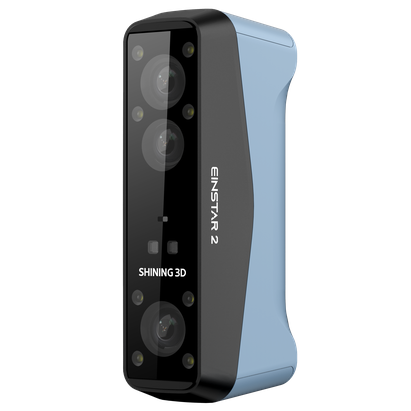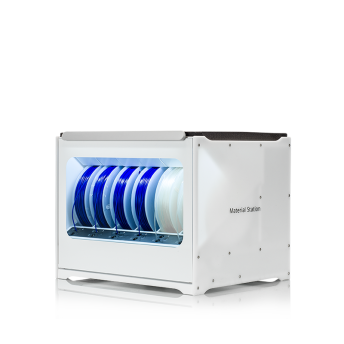EOS P 500
Το EOS P 500 είναι ένα από τα πιο προηγμένα συστήματα προσθετικής κατασκευής (3D printing) που αναπτύχθηκε από την EOS. Η σχεδίαση είναι ιδανική για την εκτύπωση πολυμερών υλικών μέσω της τεχνολογίας Laser Sintering. Πρόκειται για μία ισχυρή και ευέλικτη πλατφόρμα για τη δημιουργία υψηλής ποιότητας εξαρτημάτων με έντονη εφαρμογή σε βιομηχανικές, αεροδιαστημικές, αυτοκινητοβιομηχανικές και καταναλωτικές αγορές.
EOS P 500
Το EOS P 500 είναι ένα από τα πιο προηγμένα συστήματα προσθετικής κατασκευής (3D printing) που αναπτύχθηκε από την EOS. Η σχεδίαση είναι ιδανική για την εκτύπωση πολυμερών υλικών μέσω της τεχνολογίας Laser Sintering. Πρόκειται για μία ισχυρή και ευέλικτη πλατφόρμα για τη δημιουργία υψηλής ποιότητας εξαρτημάτων με έντονη εφαρμογή σε βιομηχανικές, αεροδιαστημικές, αυτοκινητοβιομηχανικές και καταναλωτικές αγορές.
Κύρια Χαρακτηριστικά του EOS P 500
- Τεχνολογία Πολυμερούς Laser Sintering (SLS):
- Χρησιμοποιεί τη διαδικασία Laser Sintering για την κατασκευή εξαρτημάτων από πολυμερή υλικά.
- Η διαδικασία αυτή είναι ιδανική για την παραγωγή σύνθετων γεωμετριών με υψηλή ακρίβεια και εξαιρετική επιφανειακή ποιότητα.
- Μεγαλύτερη Περιοχή Κατασκευής:
- Η περιοχή κατασκευής του EOS P 500 είναι 500 x 500 x 450 mm, επιτρέποντας την παραγωγή μεγαλύτερων εξαρτημάτων ή πολλαπλών εξαρτημάτων ταυτόχρονα.
- Ισχυρό Λέιζερ:
- Ο εξοπλισμός διαθέτει λέιζερ υψηλής ισχύος (ενισχυμένο σύστημα λέιζερ), επιτρέποντας την ακριβή τήξη των πολυμερικών σκόνων με ταχύτητα και ακρίβεια.
- Υποστηρίζει ειδικά υλικά υψηλών απαιτήσεων για αεροδιαστημική και ιατρική χρήση.
- Ποιότητα Κατασκευής:
- Εξαιρετική ποιότητα επιφάνειας και ακρίβεια σε εξαρτήματα υψηλής αντοχής, τα οποία μπορούν να χρησιμοποιηθούν άμεσα στην παραγωγή ή για πρωτότυπα και παραγωγή μικρών σειρών.
- Αυτοματοποιημένη Διαχείριση Σκόνης:
- Προηγμένο σύστημα διαχείρισης και ανακύκλωσης σκόνης, το οποίο εξασφαλίζει υψηλή απόδοση και μείωση των αποβλήτων.
- Αναβάθμιση και Ευελιξία Υλικών:
- Υποστηρίζει πολλαπλά υλικά, κυρίως πολυμερή, όπως PA12 (πολυαμίδιο) και PA11, ενώ επίσης υποστηρίζει και σύνθετα υλικά (π.χ. με πρόσθετο υλικό ενίσχυσης).
- Η ευελιξία αυτή επιτρέπει την ανάπτυξη εφαρμογών σε διάφορους τομείς, από αυτοκινητοβιομηχανία μέχρι αεροδιαστημική.
Τεχνικές Προδιαγραφές
| Χαρακτηριστικό | Τιμή |
|---|---|
| Περιοχή Κατασκευής | 500 x 500 x 450 mm |
| Τύπος Λέιζερ | Fiber Laser (πολυμερής) |
| Ικανότητα Ανακύκλωσης Σκόνης | Αυτοματοποιημένη |
| Πάχος Στρώματος | 60 – 120 μm |
| Μέγιστη Ταχύτητα Παραγωγής | Έως 25 cm³/h |
| Υποστηριζόμενα Υλικά | PA12, PA11, PA6, σύνθετα |
| Διαστάσεις Συστήματος | 2.500 x 2.000 x 2.000 mm |
| Βάρος | Περίπου 2.500 kg |
Πλεονεκτήματα του EOS P 500
- Ευρεία Γκάμα Υλικών:
- Υποστηρίζει πολυμερικά υλικά υψηλής αντοχής και εξειδικευμένα υλικά για συγκεκριμένες βιομηχανικές ανάγκες.
- Εξαιρετική ποιότητα και αντοχή για εξαρτήματα που υπόκεινται σε υψηλές απαιτήσεις.
- Αυξημένη Παραγωγικότητα:
- Η μεγαλύτερη περιοχή κατασκευής και το ισχυρό λέιζερ επιτρέπουν τη μαζική παραγωγή εξαρτημάτων με μεγάλη ταχύτητα και ποιότητα.
- Κορυφαία Ποιότητα Εξαρτημάτων:
- Εξαιρετική ακρίβεια και ποιότητα επιφάνειας, κατάλληλη για τη δημιουργία εξαρτημάτων που μπορούν να χρησιμοποιηθούν απευθείας στην τελική εφαρμογή ή για τον τομέα των πρωτοτύπων.
- Αυτοματοποιημένη Ροή Εργασίας:
- Το σύστημα έχει αναπτυχθεί για εύκολη ενσωμάτωση σε αυτοματοποιημένα περιβάλλοντα παραγωγής, βελτιώνοντας την αποδοτικότητα και την ασφάλεια των διαδικασιών.
- Ανθεκτικότητα Υλικών:
- Υλικά όπως το PA12, PA11 είναι γνωστά για την αντοχή τους σε καταπονήσεις και χημικές επιδράσεις, επιτρέποντας την κατασκευή εξαρτημάτων για χρήση σε σκληρές συνθήκες.
Εφαρμογές του EOS P 500
- Αεροδιαστημική:
- Κατασκευή εξαρτημάτων για αεροσκάφη και δορυφόρους, όπου η αντοχή, το χαμηλό βάρος και η ακρίβεια είναι κρίσιμα.
- Αυτοκινητοβιομηχανία:
- Συστήματα κινητήρων, εξαρτήματα συστημάτων ανάρτησης, και άλλα εξαρτήματα που απαιτούν αντοχή και ακρίβεια.
- Ιατρική:
- Κατασκευή εξατομικευμένων και βιοσυμβατών εμφυτευμάτων και εργαλείων για χειρουργικές επεμβάσεις.
- Βιομηχανικός Σχεδιασμός:
- Δημιουργία πρωτοτύπων, εργαλείων και εξαρτημάτων για παραγωγή μικρών σειρών.
- Καταναλωτικά Προϊόντα:
- Παραγωγή εξαρτημάτων για συσκευές, εργαλεία και άλλα προϊόντα με εξατομικευμένες ανάγκες.
Υποστηριζόμενα Υλικά
Το EOS P 500 υποστηρίζει διάφορα υλικά, κυρίως πολυμερή, όπως:
- PA12 (Polyamide 12) – Το πιο συχνά χρησιμοποιούμενο πολυμερές για γενικές εφαρμογές.
- PA11 (Polyamide 11) – Ιδανικό για εφαρμογές που απαιτούν υψηλότερη αντοχή στη διάβρωση και μεγαλύτερη ελαστικότητα.
- PA6 (Polyamide 6) – Πολύ ανθεκτικό και κατάλληλο για χρήση σε πιο απαιτητικές συνθήκες.
- Σύνθετα υλικά – Ενισχυμένα με ίνες ή άλλα υλικά για αυξημένη μηχανική αντοχή.
Συμπεράσματα
Το EOS P 500 είναι ιδανικό για βιομηχανικές εφαρμογές που απαιτούν ταχύτητα, υψηλή ποιότητα, και την ικανότητα να δουλεύουν με μεγάλη ποικιλία υλικών. Είναι ιδιαίτερα χρήσιμο για εφαρμογές στην αεροδιαστημική, αυτοκινητοβιομηχανία και ιατρική, όπου η ακρίβεια και η ανθεκτικότητα είναι κρίσιμες.
Εάν θέλεις περισσότερες πληροφορίες ή τεχνικά εγχειρίδια, ενημέρωσε μας! 😊
Μόνο συνδεδεμένοι πελάτες που έχουν αγοράσει αυτό το προϊόν μπορούν να αφήσουν μία αξιολόγηση.
EOS P 500
Το EOS P 500 είναι ένα από τα πιο προηγμένα συστήματα προσθετικής κατασκευής (3D printing) που αναπτύχθηκε από την EOS. Η σχεδίαση είναι ιδανική για την εκτύπωση πολυμερών υλικών μέσω της τεχνολογίας Laser Sintering. Πρόκειται για μία ισχυρή και ευέλικτη πλατφόρμα για τη δημιουργία υψηλής ποιότητας εξαρτημάτων με έντονη εφαρμογή σε βιομηχανικές, αεροδιαστημικές, αυτοκινητοβιομηχανικές και καταναλωτικές αγορές.Κύρια Χαρακτηριστικά του EOS P 500
- Τεχνολογία Πολυμερούς Laser Sintering (SLS):
- Χρησιμοποιεί τη διαδικασία Laser Sintering για την κατασκευή εξαρτημάτων από πολυμερή υλικά.
- Η διαδικασία αυτή είναι ιδανική για την παραγωγή σύνθετων γεωμετριών με υψηλή ακρίβεια και εξαιρετική επιφανειακή ποιότητα.
- Μεγαλύτερη Περιοχή Κατασκευής:
- Η περιοχή κατασκευής του EOS P 500 είναι 500 x 500 x 450 mm, επιτρέποντας την παραγωγή μεγαλύτερων εξαρτημάτων ή πολλαπλών εξαρτημάτων ταυτόχρονα.
- Ισχυρό Λέιζερ:
- Ο εξοπλισμός διαθέτει λέιζερ υψηλής ισχύος (ενισχυμένο σύστημα λέιζερ), επιτρέποντας την ακριβή τήξη των πολυμερικών σκόνων με ταχύτητα και ακρίβεια.
- Υποστηρίζει ειδικά υλικά υψηλών απαιτήσεων για αεροδιαστημική και ιατρική χρήση.
- Ποιότητα Κατασκευής:
- Εξαιρετική ποιότητα επιφάνειας και ακρίβεια σε εξαρτήματα υψηλής αντοχής, τα οποία μπορούν να χρησιμοποιηθούν άμεσα στην παραγωγή ή για πρωτότυπα και παραγωγή μικρών σειρών.
- Αυτοματοποιημένη Διαχείριση Σκόνης:
- Προηγμένο σύστημα διαχείρισης και ανακύκλωσης σκόνης, το οποίο εξασφαλίζει υψηλή απόδοση και μείωση των αποβλήτων.
- Αναβάθμιση και Ευελιξία Υλικών:
- Υποστηρίζει πολλαπλά υλικά, κυρίως πολυμερή, όπως PA12 (πολυαμίδιο) και PA11, ενώ επίσης υποστηρίζει και σύνθετα υλικά (π.χ. με πρόσθετο υλικό ενίσχυσης).
- Η ευελιξία αυτή επιτρέπει την ανάπτυξη εφαρμογών σε διάφορους τομείς, από αυτοκινητοβιομηχανία μέχρι αεροδιαστημική.
Τεχνικές Προδιαγραφές
| Χαρακτηριστικό | Τιμή |
|---|---|
| Περιοχή Κατασκευής | 500 x 500 x 450 mm |
| Τύπος Λέιζερ | Fiber Laser (πολυμερής) |
| Ικανότητα Ανακύκλωσης Σκόνης | Αυτοματοποιημένη |
| Πάχος Στρώματος | 60 - 120 μm |
| Μέγιστη Ταχύτητα Παραγωγής | Έως 25 cm³/h |
| Υποστηριζόμενα Υλικά | PA12, PA11, PA6, σύνθετα |
| Διαστάσεις Συστήματος | 2.500 x 2.000 x 2.000 mm |
| Βάρος | Περίπου 2.500 kg |
Πλεονεκτήματα του EOS P 500
- Ευρεία Γκάμα Υλικών:
- Υποστηρίζει πολυμερικά υλικά υψηλής αντοχής και εξειδικευμένα υλικά για συγκεκριμένες βιομηχανικές ανάγκες.
- Εξαιρετική ποιότητα και αντοχή για εξαρτήματα που υπόκεινται σε υψηλές απαιτήσεις.
- Αυξημένη Παραγωγικότητα:
- Η μεγαλύτερη περιοχή κατασκευής και το ισχυρό λέιζερ επιτρέπουν τη μαζική παραγωγή εξαρτημάτων με μεγάλη ταχύτητα και ποιότητα.
- Κορυφαία Ποιότητα Εξαρτημάτων:
- Εξαιρετική ακρίβεια και ποιότητα επιφάνειας, κατάλληλη για τη δημιουργία εξαρτημάτων που μπορούν να χρησιμοποιηθούν απευθείας στην τελική εφαρμογή ή για τον τομέα των πρωτοτύπων.
- Αυτοματοποιημένη Ροή Εργασίας:
- Το σύστημα έχει αναπτυχθεί για εύκολη ενσωμάτωση σε αυτοματοποιημένα περιβάλλοντα παραγωγής, βελτιώνοντας την αποδοτικότητα και την ασφάλεια των διαδικασιών.
- Ανθεκτικότητα Υλικών:
- Υλικά όπως το PA12, PA11 είναι γνωστά για την αντοχή τους σε καταπονήσεις και χημικές επιδράσεις, επιτρέποντας την κατασκευή εξαρτημάτων για χρήση σε σκληρές συνθήκες.
Εφαρμογές του EOS P 500
- Αεροδιαστημική:
- Κατασκευή εξαρτημάτων για αεροσκάφη και δορυφόρους, όπου η αντοχή, το χαμηλό βάρος και η ακρίβεια είναι κρίσιμα.
- Αυτοκινητοβιομηχανία:
- Συστήματα κινητήρων, εξαρτήματα συστημάτων ανάρτησης, και άλλα εξαρτήματα που απαιτούν αντοχή και ακρίβεια.
- Ιατρική:
- Κατασκευή εξατομικευμένων και βιοσυμβατών εμφυτευμάτων και εργαλείων για χειρουργικές επεμβάσεις.
- Βιομηχανικός Σχεδιασμός:
- Δημιουργία πρωτοτύπων, εργαλείων και εξαρτημάτων για παραγωγή μικρών σειρών.
- Καταναλωτικά Προϊόντα:
- Παραγωγή εξαρτημάτων για συσκευές, εργαλεία και άλλα προϊόντα με εξατομικευμένες ανάγκες.
Υποστηριζόμενα Υλικά
Το EOS P 500 υποστηρίζει διάφορα υλικά, κυρίως πολυμερή, όπως:- PA12 (Polyamide 12) – Το πιο συχνά χρησιμοποιούμενο πολυμερές για γενικές εφαρμογές.
- PA11 (Polyamide 11) – Ιδανικό για εφαρμογές που απαιτούν υψηλότερη αντοχή στη διάβρωση και μεγαλύτερη ελαστικότητα.
- PA6 (Polyamide 6) – Πολύ ανθεκτικό και κατάλληλο για χρήση σε πιο απαιτητικές συνθήκες.
- Σύνθετα υλικά – Ενισχυμένα με ίνες ή άλλα υλικά για αυξημένη μηχανική αντοχή.
Συμπεράσματα
Το EOS P 500 είναι ιδανικό για βιομηχανικές εφαρμογές που απαιτούν ταχύτητα, υψηλή ποιότητα, και την ικανότητα να δουλεύουν με μεγάλη ποικιλία υλικών. Είναι ιδιαίτερα χρήσιμο για εφαρμογές στην αεροδιαστημική, αυτοκινητοβιομηχανία και ιατρική, όπου η ακρίβεια και η ανθεκτικότητα είναι κρίσιμες.Εάν θέλεις περισσότερες πληροφορίες ή τεχνικά εγχειρίδια, ενημέρωσε μας! 😊Σχετικά προϊόντα με το EOS P 500...
21,073.80 € με ΦΠΑ
Διαθέσιμο κατόπιν παραγγελίας
3,720.00 € με ΦΠΑ
Διαθέσιμο κατόπιν παραγγελίας









Αξιολογήσεις
Δεν υπάρχει καμία αξιολόγηση ακόμη.